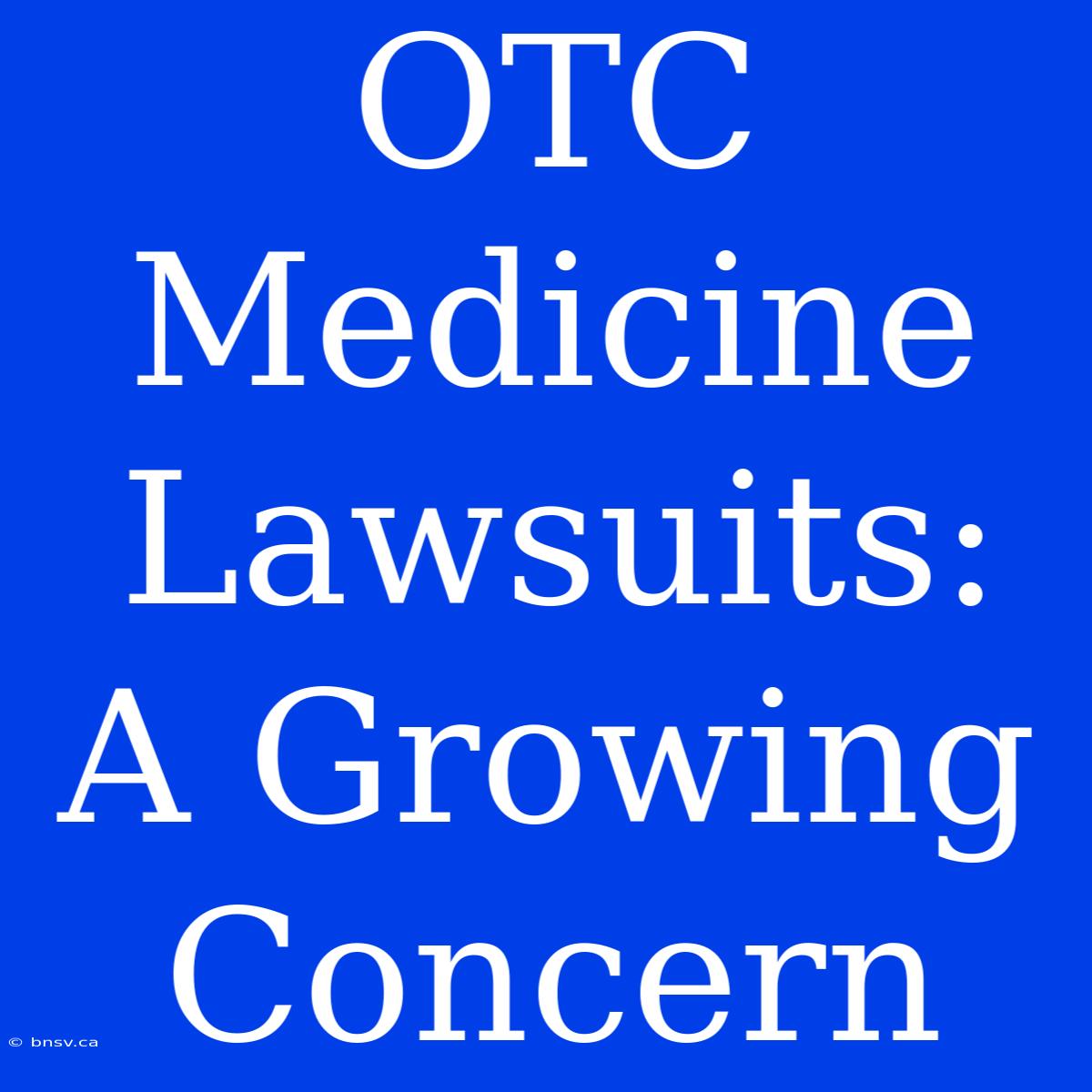OTC Medicine Lawsuits: A Growing Concern - Uncovering the Risks and Implications for Consumers
What are the most common types of OTC medicine lawsuits, and why are they on the rise? A bold statement: Consumers are increasingly seeking legal recourse over potential harms associated with over-the-counter medications, highlighting a critical need for greater transparency and accountability within the industry.
Editor Note: This article explores the current trends in OTC medicine lawsuits, published today, delving into the factors driving this surge. We examine the complexities of product liability claims, consumer awareness, and the evolving regulatory landscape surrounding OTC medications.
Analysis: This guide draws on extensive research into recent legal cases, expert opinions, and regulatory developments. It aims to equip consumers and healthcare professionals with a comprehensive understanding of the potential risks and legal implications associated with OTC medications.
Navigating the Complexities of OTC Medicine Lawsuits:
OTC Medicine Lawsuits
- Product Liability Claims: These lawsuits allege that a manufacturer failed to adequately warn consumers about potential risks associated with their product, or that the product was defectively designed or manufactured.
- Failure to Warn: Plaintiffs often argue that the manufacturer failed to provide sufficient warnings about potential side effects, drug interactions, or contraindications.
- Defective Design: Lawsuits can also arise from allegations that the product was inherently dangerous due to its design.
Factors Driving the Rise of OTC Medicine Lawsuits
- Increased Consumer Awareness: Consumers are becoming more informed about potential risks associated with medications, thanks to increased access to information online and through social media.
- Direct-to-Consumer Advertising: Aggressive marketing campaigns often focus on the benefits of medications, potentially downplaying potential risks.
- Regulatory Changes: The FDA has been working to streamline the approval process for OTC medications, but some argue that this process may be insufficient to ensure the safety of all products.
The Impact of OTC Medicine Lawsuits:
- Financial Implications: Lawsuits can result in substantial financial settlements or judgments for plaintiffs, while also leading to significant legal expenses for manufacturers.
- Public Image: Negative publicity associated with lawsuits can damage the reputation of manufacturers and impact consumer trust.
- Regulatory Scrutiny: Lawsuits can prompt regulatory agencies to investigate potential safety concerns and may lead to stricter regulations.
A Closer Look at Key Aspects:
Product Liability Claims
- Negligence: Manufacturers have a duty to exercise reasonable care in the design, manufacture, and marketing of their products.
- Strict Liability: Some states hold manufacturers strictly liable for defects in their products, regardless of fault.
- Statutes of Limitation: There are time limits for filing product liability lawsuits, so it is important to seek legal advice promptly if you believe you have been harmed by an OTC medication.
Failure to Warn
- Adequacy of Warnings: The adequacy of warnings is often a key issue in OTC medicine lawsuits.
- Target Audience: Manufacturers must consider the level of understanding of their intended target audience when developing warnings.
- Clear and Concise Language: Warnings should be clear, concise, and easy to understand for the average consumer.
The Role of the FDA
- Premarket Review: The FDA reviews OTC medication applications to ensure safety and effectiveness.
- Post-Market Surveillance: The FDA continues to monitor OTC medications after they are approved, and can take action to address safety concerns.
- Drug Safety Reporting: Consumers are encouraged to report any adverse events related to OTC medications to the FDA.
FAQ
Q: What are common examples of OTC medicine lawsuits?
A: Lawsuits involving ibuprofen (adverse gastrointestinal effects), acetaminophen (liver damage), and certain antihistamines (sedation and drowsiness) are common examples.
Q: Who can be sued in an OTC medicine lawsuit?
A: Lawsuits can target manufacturers, distributors, and retailers.
Q: What evidence is needed to win an OTC medicine lawsuit?
A: Plaintiffs need to demonstrate that the medication caused their injuries, that the manufacturer was negligent or the product was defective, and that they suffered damages.
Q: How can I protect myself from OTC medicine risks?
A: Read the label carefully, be aware of potential interactions with other medications, and consult with a healthcare professional if you have any concerns.
Tips for Navigating OTC Medicine Lawsuits:
- Document Everything: Keep detailed records of your symptoms, medication use, and any interactions with healthcare professionals.
- Seek Legal Advice: Contact an experienced attorney who specializes in product liability cases.
- Understand Your Rights: Research your state's laws regarding product liability and statutes of limitations.
Summary: This article has delved into the complexities of OTC medicine lawsuits, highlighting their growing prominence. It explored the factors contributing to this trend, examining the roles of manufacturers, regulatory agencies, and consumers.
Closing Message: The increasing prevalence of OTC medicine lawsuits necessitates a multifaceted approach involving greater consumer awareness, stricter regulatory oversight, and an ongoing dialogue between manufacturers and consumers to ensure the safety and efficacy of over-the-counter medications.

